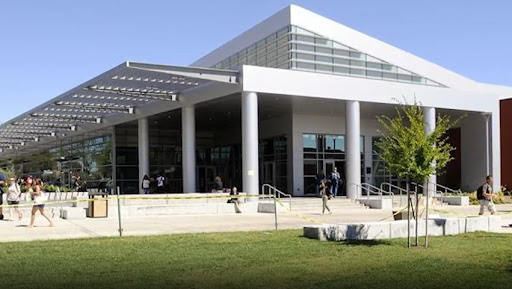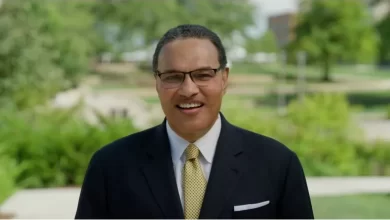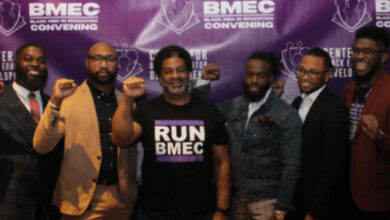
American River College President Is Community-Focused
By Genoa Barrow | Sacramento OBSERVER Senior Staff Writer

It’s a new year and American River College’s new president, Melanie Dixon says exciting things are ahead for the local campus. (Photo by Russell Stiger, Jr.)
The way education is delivered may look different these days, but American River College remains committed to preparing students for a more certain future, its new president says.
Melanie Dixon officially assumed the helm at ARC last month, after being named to the position late last year. Ms. Dixon previously served as Los Rios Community College District’s Associate Vice Chancellor of Educational Services and Student Success. She joined the district in 2014 as Dean of Student Services at Folsom Lake College.
The Sacramento OBSERVER recently spoke to Ms. Dixon about her vision for the campus and leading at a moment in time that demands for real change to occur.
“As a Black woman, I think there is a calling to respond to some of the challenges that the Black community face, but also just underserved communities,” she said. “The ‘have nots,’ if you will, the ‘less than,’ the marginalized.
“On a very personal and professional level, that speaks to me, to lend my leadership and to step in with some courage around being able to speak to structures that are racist, speak to practices that require an overhaul, and speak to (structural) practices that require attention to be reflective in the communities in which we serve.”
Challenging times are ahead, brought on by current racial and economic climates which Ms. Dixon says, calls for some “healing and truth telling.”
ARC’s student population is predominantly White and male. Thirty percent are Latinx and the African American student population fluctuates between 13 and 18 percent, with many now identifying as mixed race.
“We have to look at the demographics in our community and make sure that we’re representative, that’s part of what the work is,” Ms. Dixon shared.
“We need to retool about how do we provide outreach to communities of color and create those opportunities, but more importantly, I think, is how do we provide mentorship in a very meaningful way? Part of it is educating ourselves about how to serve our community, but then creating the space.
“We will always be able to do better. Our hiring processes don’t necessarily move as quickly as the demographics change in our communities, but it’s our obligation to try to keep a finger on that pulse,” she said.
She points to current leadership at the local community college campuses.
“It’s definitely a sign of the commitment to equity work and being representative of the communities that we serve and recognizing where the leadership needs to happen,” Ms. Dixon said.
“It is not by happenstance that we have a very diverse presidency or leadership line. If you look at Cosumnes, where Dr. (Edward) Bush is a phenomenal leader and has done some very forward leading work, but more importantly is closing equity gaps for students. We have President (Michael) Gutierrez over at Sacramento City College, who has done some really incredible work around diversifying his faculty and employee base to be reflective of the community and then you have (Dr. Whitney Yamamura) an Asian American male over at Folsom Lake College who is doing amazing work. I think it is intentionality. If you look at our manager ranks, I think you will see a great diversity there as well. We have to continue those efforts.”
Ms. Dixon says ARC has a vision in place that it’s been working on. She hit the ground running, she says, to understand what elements of the existing vision are working best.
“My vision overall for ARC is to be reflective of the communities that we represent, but it’s also serving the community, how do we create employment for that community. How do we develop programs?”
Ms. Dixon points to a dual enrollment program that allows area high school students to take courses at the college and possibly earn an associate’s degree at the same time as their high school diploma.
“It’s a critical program for serving communities of color in particular and especially in areas where we know that college-going cultures aren’t necessarily pushed as much as they should be or as we see in more affluent communities,” she said.
She’s also excited about the campus’ new STEM building, calling it “critical” to diversifying the pipeline of students going into the science and technology fields.
ARC will remain closed at least through the spring semester, due to COVID-19. Leaders are still in conversation about reopening plans. They’re watching the vaccination rollout carefully and are stockpiling personal protective equipment for students and staff for when “the dust settles” and everyone returns to campus for traditional or hybrid instruction. Even the pandemic has provided opportunities.
“The programs we are running are considered first responder programs, so nursing, respiratory care, EMTs,” Ms. Dixon said. “Those programs that, If in fact the pandemic will get out of control in our particular area, we will push our students into the system to provide support.
Ms. Dixon is the first African American woman to lead American River College. She follows two other Black women who recently led local community colleges: Kathryn Jeffery served as president of Sacramento City College from 2008 to 2016 and Thelma Scott-Skillman was the founding president of Folsom Lake College and served in that capacity from 2001 to 2012.
This article originally appeared in the Sacramento Observer.










